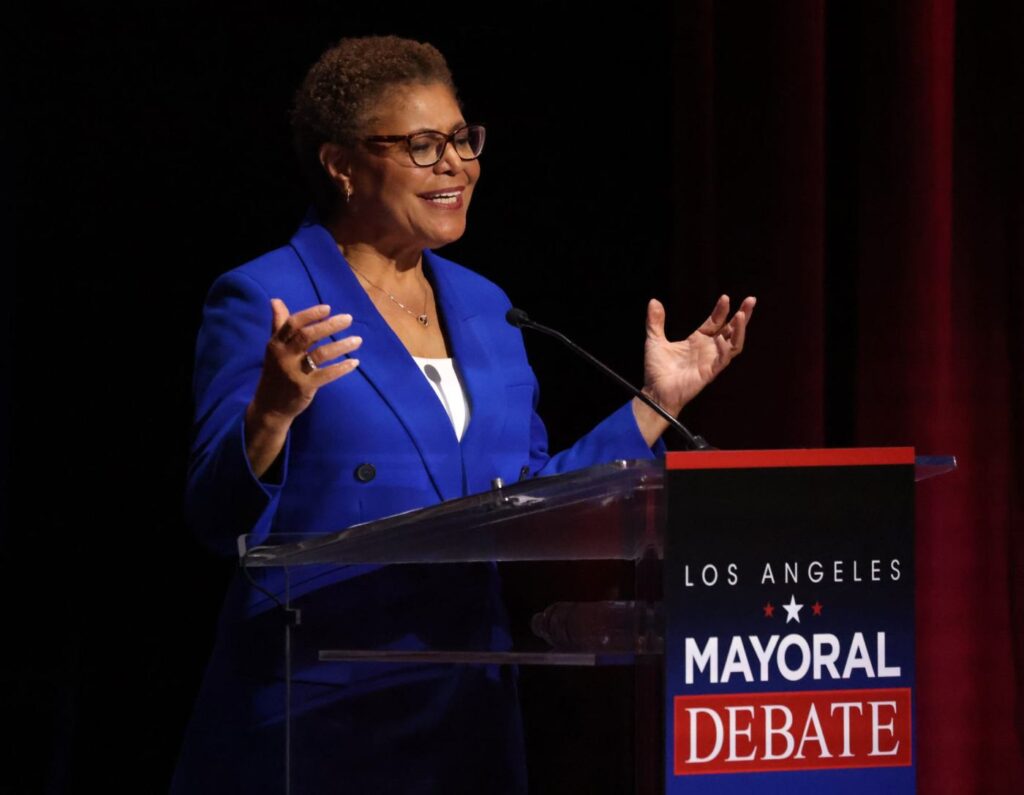
According to the latest statewide survey from the Public Policy Institute of California, 64% of all adults say homelessness is a big problem in their part of the state. Among likely voters, it’s 67%.
So it’s no surprise that in an election year, less than a month before ballots mail out to voters for the June 7 primary, everybody on the ballot has an idea of how to solve the problem of homelessness.
What may surprise you is that there are some very good ideas. They deserve to be showcased so voters know what’s possible in California. It doesn’t have to be like this.
Let’s start at the top of the ticket, where author and journalist Michael Shellenberger is running for governor. In his recent book, “San Fransicko,” he documents the chaos caused by the policies of the current government. “I researched and assembled extensive evidence showing that ‘homelessness’ results primarily from mental illness and addiction, not poverty,” he wrote in these pages last week.
That’s a direct challenge to what has been the current government’s political narrative about the crisis – that it is a problem of affordable housing, the only solution is a free apartment with wrap-around services, and taxpayers must pay to house the homeless near their own homes.
Shellenberger’s good idea is to create a statewide agency called Cal-Psych “to meet the needs of the state’s addicted and mentally ill populations.” Currently the 58 counties in California provide mental health and addiction services, a system that Shellenberger calls “a failure.”
It’s not a lack of money that prevents something like Cal-Psych from moving forward. It’s the blithering idiocy of politicians who pretend that people are living on the sidewalks in filthy tent encampments only because housing is too expensive. “To be clear,” Shellenberger wrote, “They’re not homeless encampments. They’re open drug markets where dealers are taking advantage of human beings who need mental health and addiction treatment.”
In Los Angeles, where a recent poll by the Institute of Governmental Studies at UC Berkeley found that 61% of city voters named homelessness as the #1 issue that will determine their vote for the next mayor, mayoral candidate Rep. Karen Bass is also talking about the need to address what she describes on her website as “the severe shortage of mental health and substance abuse disorder services, support and capacity.”
Bass told the editorial board of this newspaper that she has spoken to the governor’s office about the need to seek a waiver from what’s known as the IMD exclusion – the provision in federal law that prohibits the use of federal Medicaid dollars to pay for mental health care in any facility with more than 16 beds. Back in 1965, when that law was signed by President Lyndon Johnson, it seemed like a good idea to deinstitutionalize mental health care and just have community clinics that would dispense the new and promising prescription drugs to treat mental illness.
One consequence of that law was the financial destruction of state mental health hospitals. Ineligible for Medicaid/Medi-Cal reimbursement, they saw their patient populations routed away to general medical hospitals or to the streets.
During the Trump administration, the federal government created a process to allow states to seek a waiver from the IMD exclusion. California has declined to do so. As a result, the state is missing the opportunity to build and staff adequate facilities for the treatment of severe mental illness and substance use disorder. We don’t have the beds we need. This is why.
Bass told the editorial board that Gov. Gavin Newsom’s office told her the governor planned to seek a waiver from the IMD exclusion later this year. The governor’s press office did not respond to an email asking if this was true.
Here’s another good idea: helping the homeless in a way that recognizes the needs and the rights of everybody else. Businessman Rick Caruso told our editorial board that he would quickly build shelters to provide 30,000 beds, but said he understands and respects the concerns of people in residential neighborhoods and would build the shelters on unused city properties in commercial and industrial areas. City Councilman Joe Buscaino emphasized the need to enforce anti-camping ordinances when individuals refuse an offer of shelter.
L.A. City Council candidate Scott Silverstein offers a good idea based on years of experience building and renovating facilities for nonprofit organizations. His plan calls for the city to enter into long-term leases for residential buildings instead of buying the real estate up front. The contracts would allow the city to gradually build equity in the buildings and eventually own them, while saving tens of millions of dollars that could be spent on services in the meantime. Nonprofit organizations would own the buildings and lease them to the city, a public-private partnership that enables favorable financing terms.
Related Articles
Honoring the life of Armando Navarro — scholar, activist and Chicano leader
A federal jury delivers a rebuke of FBI entrapment
Jay Chen should know better than to mock immigrants like me: Michelle Steel
An ‘uncontrolled’ internet is freedom, not dictatorship
Passover and freedom from oppression
L.A. County Supervisor candidate Roxanne Hoge would seek an audit of the billions of dollars spent by the county on homelessness while the problem only got worse. As a mom of four school-age kids, she observed that the current Board of Supervisors has allowed the county’s public libraries to become “pornhub-homeless-bathroom shelters.”
Some longtime incumbent politicians are now rushing forward with “plans” to address the crisis of homelessness, brazenly presenting them as if someone else has been in office all this time.
You don’t have to let them get away with it. Ballots mail out in early May. Mark your calendar to hold everybody accountable.
Write Susan at Susan@SusanShelley.com and follow her on Twitter @Susan_Shelley.
